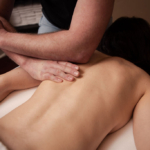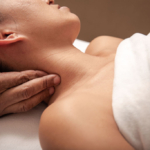The Secret Life of Your Muscles
Deep Dive into How Massage Truly Works
Have you ever taken a moment to consider why you feel so rejuvenated and at peace after a massage? It’s not just about alleviating sore muscles; there’s a whole world happening beneath the surface.
Muscles, often perceived solely as instruments of physical strength, are in fact storerooms of secrets far more intricate.
Let’s explore the surprising aspects of muscle behavior and how massage plays a transformative role not just physically, but mentally and at a cellular level. Understanding the profound impact of massage therapy will deepen your appreciation for each stroke and knead.
Muscles and Memory

Muscles possess a kind of ‘memory,’ a phenomenon that goes beyond mere physicality. This ‘muscle memory’ isn’t just about retaining skills or movements, but also about holding onto emotional and physical stress. Chronic tension, often a result of repetitive stress or emotional burdens, can become ‘stored’ in muscle fibers.
During a massage, as the therapist works through these layers, it’s possible to release these long-held tensions. This release is not just physically liberating but can be emotionally cathartic, too. This process of ‘retraining’ the muscles aids in disrupting patterns of tension and can lead to improved physical and emotional wellbeing.
The Nervous System Connection
The impact of massage on the nervous system is profound. Techniques from gentle touch to deep tissue can activate the parasympathetic nervous system, or the “rest and digest” response. This engagement leads to notable changes: a reduction in heart rate, a decrease in blood pressure, and more relaxed breathing. These changes foster a state of deep relaxation and recovery.
In addition to these physiological effects, massage influences the body’s chemical balance. It can decrease cortisol, the stress hormone, while increasing mood-boosting neurotransmitters like serotonin and dopamine. This hormonal shift contributes to reduced stress and an improved emotional state.
Microscopic Muscle Repair

Massage therapy plays a crucial role at a microscopic level, particularly in muscle repair and recovery. The gentle stretching and kneading actions during a massage not only relieve tension but also stimulate the production of mitochondria within muscle cells. These mitochondria are the powerhouses of the cell, essential for energy production. Their increased presence is vital for healing, muscle growth, and overall cell vitality.
This is especially beneficial following physical activities or workouts, where muscle fibers have been strained or damaged. Enhanced mitochondrial activity accelerates muscle fiber repair, leading to faster recovery and improved muscle function. Moreover, this stimulation aids in the removal of metabolic waste products from muscle cells, further enhancing recovery and reducing the likelihood of muscle soreness and fatigue. Thus, regular massage therapy can be a key component in an athlete’s or active individual’s recovery regimen, promoting not just immediate relief but also long-term muscle health.
Boosting Immune Function
The benefits of massage therapy extend to enhancing the immune system’s functionality. It has been observed through research that massage can increase the activity of the body’s natural killer cells. These cells are an integral part of the immune system, playing a significant role in combating infections and potentially cancerous cells. The link between stress reduction and immune function is pivotal.
Massage therapy contributes to lowering cortisol levels, a hormone associated with stress. Elevated cortisol can impair immune responses, making the body more susceptible to infections and diseases. By reducing stress and cortisol levels, massage not only provides a sense of relaxation but also fortifies the body’s natural defense mechanisms. This natural and therapeutic immune boost is a great way to strengthen the body’s resilience against illnesses.
The Fascia Factor
Fascia, the connective tissue surrounding muscles, plays a critical role in our body’s movement and flexibility. This tissue can become stiff and restrictive over time due to factors like injury, inactivity, or repetitive motion. Such stiffness can lead to discomfort, pain, and reduced mobility. Massage therapy addresses these issues by targeting the fascia. Massage helps in ‘melting’ the fascial restrictions, thereby promoting lubrication and enabling muscles to move more freely. This not only improves flexibility and reduces pain but also impacts posture and body alignment.
The release and mobilization of fascia can lead to dramatic improvements in body mechanics and overall physical function. Regular massage can prevent the build-up of fascial restrictions, thereby aiding in maintaining a healthy, pain-free, and well-aligned body.
Psychological Benefits

The psychological advantages of massage are supported by extensive clinical research. Studies have shown that massage therapy can lead to significant reductions in symptoms of mental health issues such as anxiety and depression. The mechanism behind this involves the release of endorphins and serotonin, neurotransmitters linked to feelings of happiness and a state of calm. These chemicals, released during the physical touch of a massage, can profoundly affect one’s emotional state.
The therapeutic touch provided in massage offers more than physical relaxation—it can be a powerful tool in managing mental health, offering a non-invasive and holistic approach to improving psychological wellbeing. Furthermore, the safe and nurturing environment of massage therapy can help foster a sense of trust and comfort, essential elements in addressing emotional distress and fostering mental health.
Embrace massage therapy as a key to holistic health.
It’s more than just a tool for relaxation; it’s a vital element that offers profound benefits from muscle recovery to emotional well-being. Integrating massage into our lives can significantly enhance our physical, mental, and emotional health. Consider massage not just as an occasional indulgence but as an essential practice for maintaining overall wellness, facilitating healing from the cellular level up to the way we interact with the world.
Other articles you might also be interested in: Making The Most Of Your Massage
Tag: The Secret Life of Your Muscles

